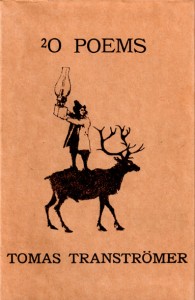
 |
| My Introduction to Tranströmer: from Robert Bly’s Seventies Press, translated by Bly, 1970, with the Swedish originals en face |
I have heard the Swedes singing cheek to cheek.
I do not think they will sing to me.
But that’s ok. I feel like they’ve sung to me—sort of—because Tranströmer was on the No Bull Prizes list I posted back in 2007. The NYT calls his poetry “bleak but powerful,” which is only half true, because Tranströmer (it seems to me) is seldom bleak. In fact, he consistently honors the persistence of a rich inner life in what has been perhaps the least inward period in human history—a period in which inwardness itself has been relegated to the realm of neurosis. He’s also written a number of profound political poems, like this one from the volume pictured to the right:
FROM AN AFRICAN DIARY
(1963)
In the painting of the kitsch Congolese artists
The figures are skinny as insets, their human energy saddened.
The road from one way of life to another is hard.
Those who are ahead have a long way to go.
A young African found a tourist lost among the huts.
He couldn’t decide whether to make him a friend or object of blackmail.
The indecision upset him. They parted in confusion.
Europeans huddle around their cars as if the cars were Mama.
Cicadas are strong as electric razors. The cars go back.
Soon the lovely darkness comes and washes the dirty clothes. Sleep.
Those who are ahead have a long way to go.
Perhaps a migratory flock of handshakes would help.
perhaps letting the truth escape from books would help.
We have to go farther.
The student studies all night, studies and studies so he can
be free. When the examination is over, he turns into a
stair-rung for the next man.
A hard road.
Those who are ahead have a long way to go.
I want to add that while Robert Bly has been a steady and energetic advocate for Tranströmer’s work, other translators have helped to establish his influence in English. Chief among these is Robin Fulton, whose translation of Tranströmer’s new and collected poems, The Great Enigma, was issued by New Directions in 2006. It includes Fulton’s magnificent version of the visionary meditation “Baltics.”


 Joseph Hutchison, Colorado Poet Laureate 2014-2019, has published 20 collections of poems and edited or co-edited three poetry anthologies. He currently directs two master’s-level programs for University College at the University of Denver: Professional Creative Writing and Arts & Culture Management. Joe lives with his wife, Melody Madonna, in the mountains southwest of Denver, Colorado, the city where he was born.
Joseph Hutchison, Colorado Poet Laureate 2014-2019, has published 20 collections of poems and edited or co-edited three poetry anthologies. He currently directs two master’s-level programs for University College at the University of Denver: Professional Creative Writing and Arts & Culture Management. Joe lives with his wife, Melody Madonna, in the mountains southwest of Denver, Colorado, the city where he was born. 










Good, Lyle! It's helpful for academics like Jonathan to hear from poets on this subject.
Joseph, I followed the link to Jonathan Mayhew's post (in your comment above), and added my own two cents to the comment string there. Thanks for posting the link here.
I don't think much of it. Especially in context. He was reacting, I think, to the selection of Doris Lessing for the prize. In what universe is Doris Lessing politically correct? Not that I'm wild about her writing, which has always seemed prolix and faux visionary to me. But nobody can accuse her of not going her own way, and I admire that in a writer. Bloom does, too—so I'm baffled
Joseph,<br /><br />what do you make of Harold Bloom's claim that the Nobel is a form of political correctness?
Surely part of the function of Nobels is to introduce us to writers unknown to us. No surprise that not every writer will be to our taste—hence the carping going on over Tranströmer. One <a href="http://jonathanmayhew.blogspot.com/2011/10/nobel-goes-to.html" rel="nofollow">blogger I follow</a>, Jonathan Mayhew, complained that Tranströmer isn't "relevant," by which he means "
I also have loved Transtromer's poems for many many years — I first read him in Bly's selection in <i>Friends, You Drank Some Darkness</i> after the book came out in 1975. I concur with your comments about the great inwardness and inner life in his poems.<br /><br />That great line of his about the white walls of the church surrounding the congregation "like a cast on the broken arm
An excellent pick!<br /><br />I've only recently come to know Tranströmer in translation, and he delights and enlightens at the same time. Great work.